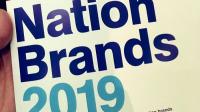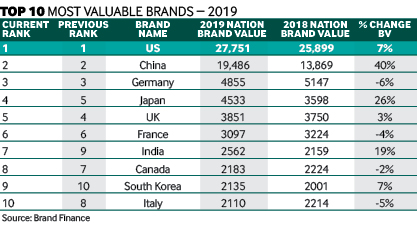Brand value booms in emerging economies

The 2019 Brand Finance Nation Brand report highlights strong performances from developing countries, while developed economies stagnate.
China is the biggest winner in the latest Brand Finance Nation Brand report.
The country’s brand value increased by an impressive 40% to $19,486bn in 2019 from $13,869bn in 2018, keeping China as the world’s second most valuable brand behind the US.
China’s healthy brand growth is part of a global trend in the study: developing countries grew an average of 13.9%, while developed countries grew by 0.4%.
“In this time marked by change, it is more important than ever that governments, trade bodies and businesses take steps to ensure that their nation brand is strategically appropriate and well-managed,” says Brand Finance CEO David Haigh. “In a global marketplace, branding is one of the most important assets of any state, encouraging inward investment, adding value to exports, and attracting tourists and skilled migrants.”
The rankings are compiled using data on each country’s goods and services, investment and society. This data is used to rate the strength of a country’s brand on a scale of zero to 100.
This brand strength ranking is then used to calculate a country’s brand value using a variation of the royalty rate system used to calculate the value of companies. The rate is applied to the country’s GDP projections from the Internationa Monetary Fund, and discounted by a rate calculated from the country’s weighted average cost of capital. This gives the brand’s net present value.
The 10 most valuable country brands remain unchanged from 2018, but there has been some significant change in order, with Japan rising to fourth place after growing by 26%, or $935bn.
Eleven of the 20 fastest-growing brands of 2019 come from the Middle East and Africa. The most dominant European nations, such as Italy, France, Germany and the UK, have either decreased in value or seen negligible growth.
Ireland bucks this trend as the fastest-growing brand in Europe, growing by 12% to $604bn, despite uncertainty over the consequences of Brexit for the EU.
Singapore remains the world’s strongest brand, receiving a AAA+ brand rating and an index score of 90.5, the only score above 90.
“Singapore’s pioneering efforts in human capital development make it an exemplary nation for its high-class healthcare facilities and first-rate education. These are the types of investments which drive the nation’s sustained growth and build brand strength,” says Mr Haigh.
Singapore’s brand strength may show other countries how brand value can be generated to attract greenfield investment.
“Much like consumers, investors are predictable, and nation brand managers must study their needs,” says Laurence Newell, non-executive director at Brand Finance Americas.
Turkey’s brand value saw a significant turnaround from 2017 to 2018, when it lost a third of its brand value. From 2017 to 2018 its brand value grew by 46.5% to $560bn. This points to a recovery from the 2018 recession and the lira’s severe inflation.

Global greenfield investment trends
Crossborder investment monitor
|
|
fDi Markets is the only online database tracking crossborder greenfield investment covering all sectors and countries worldwide. It provides real-time monitoring of investment projects, capital investment and job creation with powerful tools to track and profile companies investing overseas.
Corporate location benchmarking tool
fDi Benchmark is the only online tool to benchmark the competitiveness of countries and cities in over 50 sectors. Its comprehensive location data series covers the main cost and quality competitiveness indicators for over 300 locations around the world.
Research report
fDi Intelligence provides customised reports and data research which deliver vital business intelligence to corporations, investment promotion agencies, economic development organisations, consulting firms and research institutions.
Find out more.





